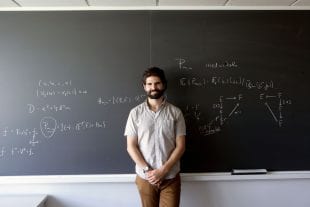5-year grant will support study of dynamical systems, mathematical instruction
Ronen Mukamel, an assistant professor of mathematics at Rice, is the recipient of a prestigious National Science Foundation CAREER award, which are given to the country’s most promising young faculty.
Mukamel will use the five-year award to address fundamental challenges in the study of dynamical systems and billiards in polygons. Ubiquitous in the applications of mathematics, dynamical systems are mathematical objects that evolve in time. A dynamical system is involved every time math is used to predict the future, such as weather forecasts, the stock market or the behavior of particles in a solution.
“The dynamical systems in the real world are often extraordinarily complex,” Mukamel said. “My work focuses on simpler examples arising from surfaces and polygons in the hopes of understanding dynamical systems as a whole. I am particularly interested in a class of surfaces with ‘optimal’ dynamics, in which every straight-line path is either closed or uniformly distributed. Surfaces with optimal dynamics are rare gems with an enormous amount of internal symmetry. The origins of optimal surfaces remain mysterious, and mathematicians are interested in understanding and classifying them.”
Mukamel will study a simple class of dynamical systems modeled on ideal billiards in polygons with a view toward understanding the complicated dynamical systems that occur in applications. He will uncover and categorize the range of dynamical behaviors possible in billiard systems and will continue his research exploring connections between billiards and the theory of numbers.
“I will build on my recent work in which my collaborators and I discovered the first new examples of optimal surfaces in the last decade and work toward finding new examples of optimal surfaces,” he said.
Mukamel said receiving a CAREER award represents a strong vote of confidence for his research program from his colleagues.
“My current research program lies at the intersection of the fields of dynamics, geometry and number theory, and it has led me on a mathematical journey that is fascinating and full of wonder,” he said. “The questions I am pursuing are off the beaten path, and I am grateful to receive the support of the broader mathematical community in their pursuit.”
Mukamel aims to use grant resources to share his research with students. He will create a graduate course on the geometry of surfaces that will culminate in a workshop that will allow leaders in the field to interact with students. He will also work with the Say STEM Camps, organized by Rice’s Tapia Center for Excellence and Equity, to create a curriculum in mathematical biology for high school students traditionally underrepresented in STEM fields.
“For me, the most gratifying aspect of mathematics is sharing it with other people,” he said. “I believe that mathematical thinking is extraordinarily important and useful, even for students who will not ultimately study mathematics. The rigors and clarity of thought afforded by thinking deeply about mathematical concepts and organizing the logical deductions required in proofs are critical skills which serve students well in all fields. Also, it is simply great fun to share mathematics with others.”


